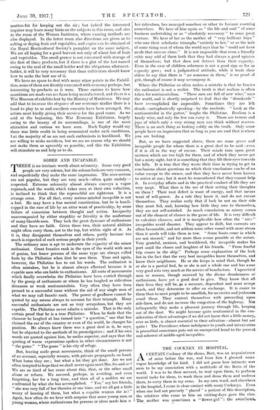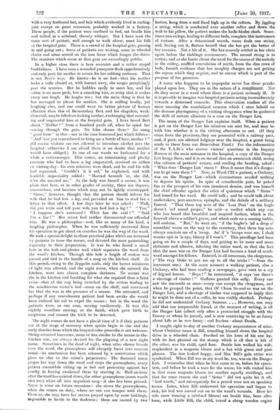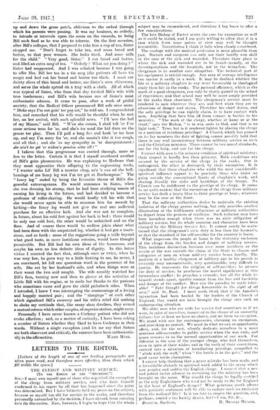THE COCKNEY IN HOSPITAL.
ACERTAIN Cockney of the slums, Bert, was an acquaintance of mine before the war, and from him I gleaned soma vague knowledge of his kind. I did not guess how intimate was soon to be my association with a multitude of the Berta of the world. I was to be their servant, to wait upon them, to perform menial tasks for them, to wash them and dress them and undress them, to carry them in my arms. In my own ward, and elsewhere in the hospital, I came in close contact with many Cockneys. Even when one had not precisely " placed " a patient of this description, the relatives who came to him on visiting-days gave the clue. The mother was sometimes a " flower-girl " : the sweetheart,
with a very feathered hat, and hair which evidently lived in curling- pins except on great occasions, probably worked in a factory.
These people, if the patient were confined to bed, sat beside him and talked in a subdued, throaty whisper. But I have seen the same sort of patient, well enough to walk about, meet his folk at the hospital gate. There is a crowd at the hospital gate, passing in and going out ; hosts of patients are waiting, some in wheeled chairs and some seated on the iron fence which fringes the drive. The reunions which occur at that gate are exceedingly public.
In a higher class there is here restraint and a rather stupid bashfulness. I have seen a wounded youngster flush apprehensively and only peck his mother in return for her sobbing embrace. That is not Bert's way. He knows—he is no fool—that his mother looks a trifle absurd as, with bonnet awry, she surges perspiringly
past the sentries. But he hobbles sprily to meet her, and his salute is no mere peck, but a smacking kiss, so noisy that it makes every one laugh. He laughs boo ; but the main thing is that he
has managed to please his mother. She is sniffing loudly, yet
. laughing also, and one could want no better picture of human affection than this of Bermondsey Bert and his shapeless, work- distorted, maybe bibulous-looking mother, exchanging that resound- ing and ungraceful kiss at the hospital gate. I have heard Bert shout " Mother ! " from a hundred yards off, when he spied her coming through the gate. No false shame there ! No smug good form " in that—nor in the time-honoured jest which follows : " And 'ave you remembered to bring me a bottle of beer, mother ? " (Of course visitors are not allowed to introduce alcohol into the hospital—otherwise I am afraid there is no doubt that mother would have obliged.) In one of our wards we harboured for a while a costermonger. This coster, an entertaining and plucky creature who had to have a leg amputated, received no callers en visiting-day—his own relatives were dead, and he and his wife bad separated. " Couldn't 'it it orf," he explained, and with leudable impartiality added : " Married beneath 'er, she did, w'en she married me." As the lady was herself a coster, it was plain that here, as in other grades of society, there are degrees, conventions, and barriers which may not be lightly overstepped. " Sister," however, thought that the patient should inform his wife that he had lost a leg, and prevailed on him to send her a letter to that effect. A few days later he was asked : " Well, did you write and tell your wife you bad lost a leg ? " " Yus." " I suppose she's answered ? What has she said ? " " Said I'm a liar ! " Her retort had neither disconcerted nor offended him. He was a philosopher—and, like so many of his kind, a laughing philosopher. When he was sufficiently recovered from his operation to get about on crutches he was the wag of the ward. He took a special delight in those practical jokes which are invented I y patients to tease the nurses, and devoted the most painstaking ingenuity to their preparation. It was he who found a small hole in the lath-and-plaster wall which separates the ward from the ward's kitchen. Through this hole a length of cotton was passed and tied to the handle of a mug on the kitchen shelf. At this period, owing to the Zeppelin raids, only the barest minimum of light was allowed, and the night nurse, when she entered the kitchen, went into almost complete darkness. No sooner was
she in the kitchen and fumbling for what she required than a faint noise—that of the cup being twitched by the cotton leading to the mischievous coster's bed—arose on the shelf, and convinced her that she was in the presence of a mouse. She retreated, and perhaps if any convalescent patient had been awake she would have enlisted his aid to expel the mouse ; but in the ward the patients were, as one man, snoring vociferously. It was this slightly overdone snoring, at the finish, which gave birth to suspicions and caused the trick to be detected.
The night nurses do not have a placid time of it if their patients are at the stage of recovery when spirits begin to rise and the early. slumber-hour which the hospital rules prescribe is not welcome. String-actuated knaveries, more or less similar to the mouse-in-the- kitchen one, are always devised for the plaguing of a new night nurse. Sometimes in the dead of night, when utter silence broods over the ward, the gramophone will abruptly burst into raucous music—its mechanism has been released by a contrivance which gives no clue to the crime's perpetrator. The flustered nurse gropes her way down the ward and stops the gramophone, every patient meanwhile sitting up in bed and protesting against her cruelty in having awakened them by starting it. Half-an-hour after the ward has quieted down, the other gramophone (some wards own two) whirs off into impudent song—it also has been primed. Nurse is wiser on future occasions : she stows the gramophones, when she comes on duty, where no one can tamper with them. Even so, she may have her nerves preyed upon by eerie tinklings, impossible to locate in the darkness these are caused by two knives, hung from a nail fixed high up in the rafters. Tiy jiggling a string, which is conducted over another rafter and down the wall to his pillow, the patient makes the knife-blades clash. Some- times two strings, leading to different beds, complete this instrument of torture. After a determined search, nurse finds one string, and, having cut it, flatters herself that she has got the better of her enemies. Not a bit of it. She has scarcely settled in her chair again before the tinklings recommence. The second string is in action; and as she hunts about the ward for the souree of the melody in the ceiling, muffled convulsions of mirth, from the dim rows of beds, furnish evidence that her naughty charges are not getting the repose which they require, and to ensure which is part of the purpose of her presence.
A nurse who happens to be unpopular never has these pranks played upon her. They are in the nature of a compliment. Nor do they occur in a ward where there is a patient seriously ill. It is impossible to imagine war-hospital patients acting inconsiderately towards a distressed comrade. This observation renders all the more amusing the scandalized concern which I once beheld on the demure physiognomy of a visiting clergyman when he gathered the drift of certain allusions to a case on the Danger List.
The name of the Danger List explains itself. When a patient is put on the Danger List his relatives are sent for, and may be with him whether it is the visiting afternoon or not. (If they come from the provinces, they are presented with a railway pass, and, if poor, are allotted lodgings near the hospital, a grant being niade to them from our Benevolent Fund.) For the information of the V.A.D.'s who answer visitors' questions in the Inquiry Bureau at the main entrance to the hospital, a copy of the Danger List hangs there, and it is on record that an awestruck child, seeing this column of patients' names, and reading the heading, asked : " What does ' Danger List' mean ? Does it mean that it's danger- ous to go near them ? " Now, in Ward C22 a patient, a Cockney, was on the Danger List—which circumstance availed nothing to depress his spirits. In spite of considerable pain, he poked fun at the prospect of his own imminent demise, and was himself the chief offender against the edict of quietness which " Sister " had issued for her ward. He would talk ; and he would talk about undertakers, post-mortems, epitaphs, and the details of a military funeral. " That there top note of the ' Last Post' on the bugle doesn't 'arf sound proper," he said—a verdict which any one who has heard this beautiful and inspired fanfare, which is the farewell above a soldier's grave, and which ends on a soaring treble, will endorse. " But," he went on, " if the bugler's 'ad a drop o' somethin' warm on the way to the cemetery, that there top note always reminds rim of a 'iccup. An' if 'e 'iccups over me, I shall wanter spit in 'is eye, blimey if I won't." This persiflage had been going on for a couple of days, and getting to be more and mom elaborate and allusive, infecting the entire ward, so that the fact that the man was on the Danger List had become a kind of catch- word amongst his fellows. Entered, in all innocence, the clergyman. (" The very bloke to put me up to all the tricks ! "—from the irreverent one.) At the same moment a walking patient, also a Cockney, who had been reading a newspaper, gave vent to a cry of feigned horror. " Boys ! " he announced, " it says 'ere there's a shortage of timber ! " Guffaws greeted this sally. Every ono saw the innuendo at once—every one except the clergyman, and when he grasped the point, that Ol' Chum So-and-so was on the Danger List, and a shortage of timber was supposed to imply that he might be done out of a coffin, he was visibly shocked. Perhaps he did not understand Cockney humour. . . . However, one may add that our irrepressible friend, at the moment of writing, is off the Danger List (albeit only after a protracted struggle with the Enemy at whom he jeered), and is now contriving to be as funny about Life as he was funny—and fearless—about Death.
I caught sight to-day of another Cockney acquaintance of mine, whose Christian name is Bill, trundling himself down the hospital drive in a wheeled chair. Perched on the knee of his one leg, with its feet planted on the stump which is all that is left of the other, was his child, aged four. Beside him walked his wife, resplendent in a magenta blouse and a hat with green and pink plumes. The trio looked happy, and Mrs. Bill's gala attire was symbolical. When Bill was in my ward he, too, was on the Danger List. I remember that when he first came to us, before his opera- tion, and before he took a turn for the worse, his wife *visited him in that same magenta blouse (or another equally startling), and that for some reason she and " Sister " did not quite hit it off, " had words," and subsequently for a period were not on speaking terms. Later, when Bill underwent his operation and began to sink, his bed was moved out on to the ward's veranda. Here his wife (now wearing a subdued blouse) sat beside him, hour after hour, while Little Bill, the child, towed a cheap wooden engine up and down the grass patch, oblivious to the ordeal through which his parents were passing. It was my business, as orderly, to intrude at intervals upon the scene on the veranda, to bring Bill such food as he was able to tolerate. On the first occasion, after Bill's collapse, that I prepared to take him a cup of tea, Sister stopped me. " Don't forget to take tea, and some bread and butter, to that poor woman. She looks tired. And some milk for the child." " Very good, Sister." I cut bread and butter, and filled an extra mug of tea. " Orderly ! What are you doing ? " Sister had reappeared. And I was rebuked because I was going to offer Mrs. Bill her tea in a tin mug (the patients all have tin mugs) and had cut her bread and butter too thick. I must cut dainty slices of thin bread and butter, use Sister's own chinaware, and serve the whole spread on a tray with a cloth. All of which was typical of Sister, who from that day treated Bill's wife with true tenderness; and Bill's wife became one of Sister's most enthusiastic adorers. It came to pass, after a week of pitiful anxiety, that the Medical Officer pronounced Bill safe once more. " Bloke says I'm not goin' ter peg art," he told me. I congratulated him, and remarked that his wife would be thankful when he met her, on her arrival, with such splendid news. " I'll 'ave the larf of my Missus," said Bill. " W'en she comes, I shall tell 'er I've some serious noos for 'er, and she's ter send the kid darn on the grarse ter play. Then I'll pull a long flea and hark 'er ter bear up, and say I'm sorry for 'er, and she mustn't tike it too rough, and all that ; and she 'as my sympathy in 'er diserpointment : she ain't ter get 'er widow's pension arter all I" I believe that this programme was carried through, more or less to the letter. Certain it is that I myself overheard another of Bill's grim pleasantries. Ho was explaining to Madame that they must apprentice their offspring to the engineering trade. " I wanter mike Lir Bill a mowter chap, so's 'e can oil the ball- bearings of me fancy leg wot I'm ter get at Roehampton." The " fancy leg " ended by being the favourite theme of Bill's dis- graceful extravaganzas. He would announce to Sister, when she was dressing his stump, that he had been studying means of earning his living in the future, and had decided to become a professor of roller-skating. He would loudly tell his wife that she would never again be able to summon him for assault by kicking—the fancy leg would not give the real 0113 sufficient purchase for an effective kick. And she was not to complain, in future, about his cold feet against her back in bed : there would be only one cold foot, the other would be unhitched and on the floor. And of course there would be endless jokes about what had been done with the amputated leg, whether it had got a tomb- stone, and so forth : some of the suggestions going a trifle beyond what good taste, in more fastidious coteries, would have thought permissible. But Bill had his own ideas of the humorous, and maybe his own no less definite ideas of dignity. In this latter virtue I counted the fact that, although once or twice, when he was very low, he gave way to a little fretting to me, he never, I am convinced, let fall one querulous word in the presence of his wife. She sat by her husband's side, and when things were at their worst the two said naught. The wife numbly watched her Bill's face, turning now and then to glance at the activities of Little Bill with his engine, or to smile her thanks to the patients who sometimes came and gave the child pickaback rides. When I intruded, I knew I was interrupting the communings of a loving and happily married pair ; and the " slanging " of each other which signalized Bill's recovery and his wife's relief did nothing to shake my certitude that, like many slum dwellers, they owned a mutual esteem which other couples, of superior station, might envy.
Personally I have never known a Cockney patient who did not evoke affection ; and, as a matter of curiosity, I have been asking a number of Sisters whether they liked to have Cockneys in their wards. Without a single exception (and let me say that Sisters are both observant and critical), the answers have bean enthusiastic-




































 Previous page
Previous page